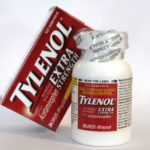 Acetaminophen (also labeled as Paracetamol, or more commonly known as Tylenol) is one of the most widely used OTC (over the counter) pain medications on the shelves today. Most of us don’t even think twice about taking something we can readily obtain from a local store when the occasional ache or pain calls for such. However, acetaminophen may just be one of the most dangerous choices on the market. Even when taken as prescribed, acetaminophen can be potentially life-threatening. As with many OTC medications, we tend to be a bit too liberal with dosage recommendations, rarely fearing taking 3 or 4 rather than the suggested 2 pills. When it comes to this pain reliever, failing to adhere to the recommended dosages could prove to be lethal. Severe health problems like liver damage and death have been reported even in so-called “mild” overdoses. In fact, hospitals deal with more acetaminophen overdoses annually than they do opiate overdoses. I can only imagine the shock and dismay, or your utter refusal to believe such a statistic — especially considering you’ve probably never heard of any of this…..
Acetaminophen (also labeled as Paracetamol, or more commonly known as Tylenol) is one of the most widely used OTC (over the counter) pain medications on the shelves today. Most of us don’t even think twice about taking something we can readily obtain from a local store when the occasional ache or pain calls for such. However, acetaminophen may just be one of the most dangerous choices on the market. Even when taken as prescribed, acetaminophen can be potentially life-threatening. As with many OTC medications, we tend to be a bit too liberal with dosage recommendations, rarely fearing taking 3 or 4 rather than the suggested 2 pills. When it comes to this pain reliever, failing to adhere to the recommended dosages could prove to be lethal. Severe health problems like liver damage and death have been reported even in so-called “mild” overdoses. In fact, hospitals deal with more acetaminophen overdoses annually than they do opiate overdoses. I can only imagine the shock and dismay, or your utter refusal to believe such a statistic — especially considering you’ve probably never heard of any of this…..
Each year acetaminophen is responsible for more than 56,000 ER visits, 2600 hospitalizations, and approximately 460 deaths due to acute liver failure. It is THE leading cause for Poison Control calls, topping 100,000+ annually. Nearly half of all acute liver failure cases in the US are due to acetaminophen poisoning, even when used as recommended daily over a few weeks time period. Those concerned about developing liver disease can take supplements and cleanse their liver to help keep it as healthy as possible. There are dozens of medications and cleanses that can be used to support liver health, you just have chosen the right one for you but once you’ve found a suitable fit, you could even try it today!
Your risk of overdosing can dramatically increase if you mix a regular dose with any other narcotic such as hydrocodone and codeine, drink alcohol while taking acetaminophen, take more than the recommended dosage, and/or if you mix more than one medicine that contains acetaminophen. It is important to be aware of how much of this pain-reliever is found in common cold medications. Acetaminophen is also found in popular prescription drugs for pain such as Percocet and Vicodin. If you are out after a night of drinking, you may want to consider reaching for a different medication in hopes of curbing the inevitable hangover headache. Combining alcohol and acetaminophen can increase the risk of kidney damage by 123%. If you have any college age children, be sure to pass this vital information along to them!
Sadly, the FDA has known about the seriousness of the dangers involved with even minor abuse of this medicine, yet continued to sweep it under the rug for over 30 years. Finally, in 2009 warning labels were added to the product. In fact, just recently the FDA decided to urge physicians to avoid prescribing any dosage containing more than 325mg as there was no evidence of its benefit vs. its risk of major liver damage.
How exactly does it cause liver damage? Acetaminophen depletes levels of the body’s chief antioxidant, glutathione. This antioxidant protects the cells from damage caused by free radicals. In fact, rapid administration of N-acetylcysteine (an amino acid precursor to glutathione) can help curb acetaminophen’s toxicity and prevent death. In addition to liver toxicity, Acetaminophen has been indicated in studies as altering our gut health, kidney and heart health, posing a cancer risk, showing an increased risk of autism, adhd, and altering brain health when used during pregnancy, altering reproductive function, and causing severe skin reaction and asthma.
When it comes to our specialty, Gout, the liver and kidneys are responsible for effectively eliminating uric acid from the body. Due to the intense negative impact acetaminophen can have on both of these vital organs, many have experienced relentless attacks at the hands of this “pain-reliever”, and likely had no idea of its contribution.
It is crucial to remember that just because medicine like this is readily available without a prescription doesn’t make it safe. Short term use at recommended levels can be helpful and necessary at times, just be smart. If you are regularly using acetaminophen or any other pain reliever for chronic pain, consider alternative methods to obtain long-term goals of repair, rather than dangerous band-aids like Tylenol. Enhancing your gut health with probiotics, increasing your inflammation fighting ability with omega-3 fatty acids from a high-quality Krill oil, maintaining proper levels of Vitamin D and other important nutrients, and considering all natural pain relievers such as Curcumin (Turmeric) and Boswellia can go a long way towards a much safer and healthier approach to repairing the underlying causes of your pain.
Very interesting topic, thanks for putting up.